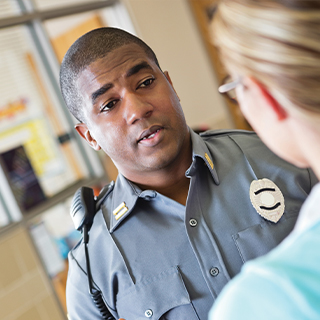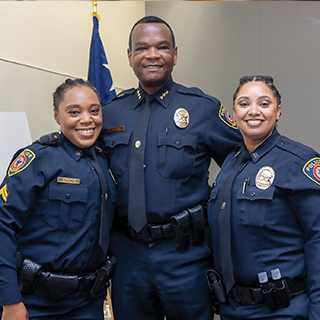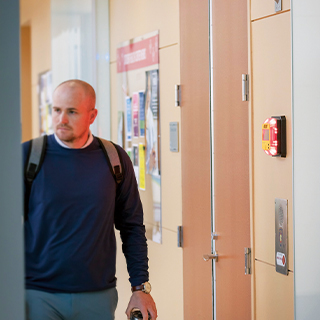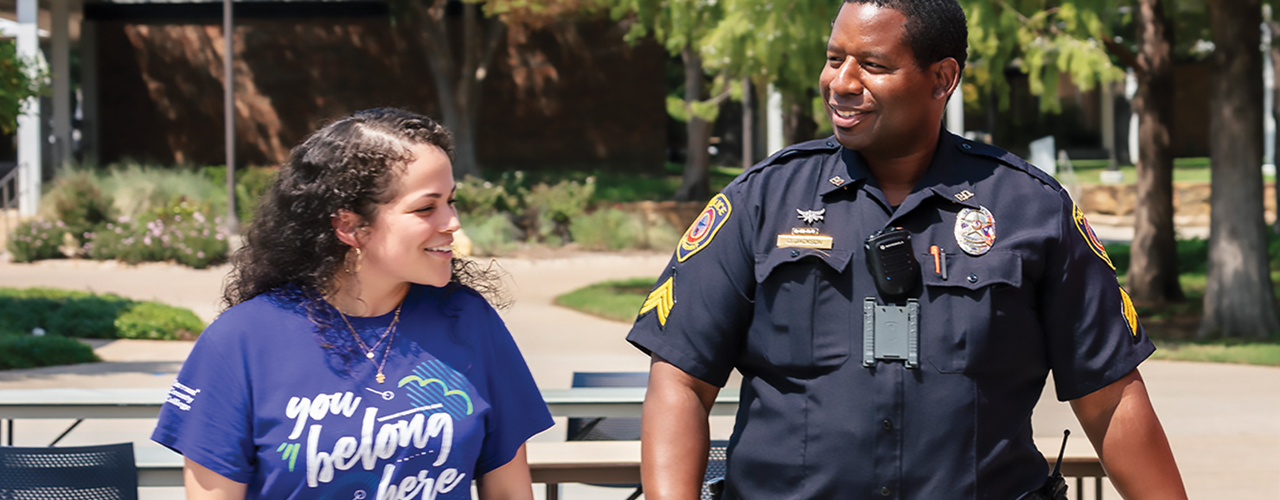Safety First
TCC's commitment to student and employee success is matched by the College's dedication to creating a secure place to work and learn.
After a long day of work, Jan Clayton gathered her things and left her office at TCC Northwest. Clayton’s mind was on dinner and the weekend ahead as she headed for the doors. But a wave of concern suddenly hit, snapping her back to the present. There was a trespasser, just outside the building, staring Clayton right in the eyes.
Before you get too worried, be aware that this trespasser was a raccoon. “At Northwest Campus, it’s not uncommon to have wildlife on our grounds,” explains Clayton, the campus’s vice president of student affairs. “The construction underway is probably affecting habitats.”
That night, this particular animal was causing a problem. “The raccoon was not budging!” Clayton recalls. “I felt silly, but I was afraid to walk out of the building.”
She called another employee, who reached out to the TCC Police Department. “Two officers immediately came to my rescue,” Clayton says. “They chased the raccoon off and walked me to my car. We laughed most of the way. But I was impressed their level of concern and support.”
Clearly, there’s no safety issue too small at TCC. And there’s no issue too big, either. The College dedicates a cross-section of departments and resources to ensuring the security of its campuses, employees and students. That includes implementing best safety practices; carrying out training and drills; swiftly and effectively dealing with potential problems as they happen and analyzing resolved concerns to improve security strategies. What’s more, TCC is taking a comprehensive approach to preventing and mitigating future safety issues with the development of a Security Master Plan—a new concept in the College’s safety methodology.
The Bigger Picture: A One College Approach
The origin of the Security Master Plan was another measure designed to make campuses and facilities even more protected. The Real Estate and Facilities department was in the process of creating a database of all doors and locks, with information that would be needed to add access control to certain areas. “While working on this project, we began seeing that a bigger picture of overall security for the District was needed, rather than one isolated area,” says Jade Ansley, a project manager with Real Estate and Facilities.
Ansley’s department gathered representatives from other areas, including the TCC Police Department, Risk Management, Emergency Management and Information Technology, among others. All play a role in keeping TCC’s six campuses and other facilities safe, and together they will develop the plan that will outline consistent tactics for everything from surveillance and police presence to alarm systems, notification systems and digital security.
“The Security Master Plan process will take the existing security measures, find areas for improvement, centralize management of data, develop operational and implementation plans, and ensure current and future measures are in alignment with a One College approach,” explains Ansley.
The plan is in its early stages; a timeline is in development, and an outside consultant will come on board to review security procedures and recommend improvements. When complete, the Security Master Plan will be a cohesive, powerful, Districtwide guide to protecting the people and locations of TCC. But the fundamental pieces of that plan are already in place, and already hard at work for the College community.
Protecting and Serving, Every Day
When people think of safety on campus, they often think of TCC Police. These certified peace officers—tasked with protecting life and property as well as maintaining a safe and secure environment—are armed and fully empowered by the state in the same ways as municipal police officers. And just as you can reach municipal emergency responders around the clock, TCC Police are on duty 24 hours a day, 365 days a year. Through the department’s call center (5-8911 from a College phone, or 817-515-8911 from another phone), students, faculty, staff and visitors can report information and request assistance. Immediate assistance can also be summoned through Code Blue phone kiosks located across campus grounds.
 TCC Police respond to criminal, medical and other calls; conduct investigations and,
through the Victims’ Assistance Unit, aid those affected by incidents, such as referring
them to College and community sources of assistance. You’ll also find TCC officers
on regular patrols at all the College’s primary campuses as well as the Opportunity
Center and the Erma C. Johnson Hadley Northwest Center of Excellence for Aviation,
Transportation and Logistics. “The mere presence of our officers is a strong deterrent
to criminal activity,” notes C. Leigh Dietrich, assistant chief for the TCC Police
Department.
TCC Police respond to criminal, medical and other calls; conduct investigations and,
through the Victims’ Assistance Unit, aid those affected by incidents, such as referring
them to College and community sources of assistance. You’ll also find TCC officers
on regular patrols at all the College’s primary campuses as well as the Opportunity
Center and the Erma C. Johnson Hadley Northwest Center of Excellence for Aviation,
Transportation and Logistics. “The mere presence of our officers is a strong deterrent
to criminal activity,” notes C. Leigh Dietrich, assistant chief for the TCC Police
Department.
The department’s authorized strength is 85 sworn peace officers plus 13 dispatchers and a dozen security guards. The unarmed guards don’t make arrests or detain anyone; however, they are a key factor in protecting campus personnel, property and resources and watching out for situations such as fire, vandalism, theft and illegal entry. The College also contracts with armed guards to provide additional security, and TCC Police work closely with law enforcement agencies in the cities where campuses are located. “We’re sharing information, providing mutual aid and keeping the lines of communication open,” Dietrich says. “We all have a vested interest in keeping TCC safe.”
Police officers also work closely with faculty and staff to support students. There is police representation on all campus CARE Teams, which exist to provide help and resources for students dealing with serious problems. “Within the area of student affairs, we engage with students in different ways, which might include addressing expectations for behavior within our College community,” Clayton says. The officers’ participation in that process “facilitates proactive conversations about safety and how to best support our students who are in crisis.”
TCC Police also share knowledge and tools that allow employees, students and campus visitors to be crime-aware and contribute to a culture of safety. TCC Police publish an annual security report that details reports of crimes across the District, as required by federal law; each campus’ officers also maintain a localized crime log that anyone may view. In addition, a specialized Crime Prevention Unit participates in campus health and safety fairs, orientations and other events to talk about reducing the risk of becoming a victim and the importance of reporting any concerns.
Ready for Anything
Drills and trainings are another way the College prepares all its stakeholders for worst-case scenarios: everything from dating violence (part of a Title IX program required for new students) to severe weather and that situation that has rocked education at every level—school shootings. Readiness for that kind of large-scale crisis brings together a variety of College experts.
“The TCC Police Department works with the Department of Emergency Management to train and prepare for situations requiring evacuation, lockdown and shelter in place,” Dietrich says. “Drills are conducted each semester, at every main campus location and center, to assist in preparing the students, faculty and staff to respond appropriately.” TCC’s emergency teams also drill their own members for catastrophic situations, to practice their response and fine-tune their protocol. Even the College’s high-level administrators take part in tabletop exercises to ensure they’re ready for virtually anything.
 Those drills and exercises represent just one part of the Department of Emergency
Management’s wide-ranging mission. “We manage the resources and have responsibility
for dealing with all aspects of emergencies—preparedness, response, mitigation and
recovery,” shares Kirk Driver, director of Emergency Management. His team’s day-to-day
work involves updating response plans and other readiness activities, but at any time,
the focus could shift to an emergency in progress.
Those drills and exercises represent just one part of the Department of Emergency
Management’s wide-ranging mission. “We manage the resources and have responsibility
for dealing with all aspects of emergencies—preparedness, response, mitigation and
recovery,” shares Kirk Driver, director of Emergency Management. His team’s day-to-day
work involves updating response plans and other readiness activities, but at any time,
the focus could shift to an emergency in progress.
That shift was massive in spring 2020, when COVID-19 hit North Texas. Driver and his colleagues began leading the changeover of all classes to an online environment; ensuring personal protection equipment got into the hands of employees and students when on-campus and face-to-face interactions were necessary and coordinating with state and federal agencies on the latest guidelines. When the situation permitted a return to campus, Emergency Management staff oversaw that transition and tracked student cases of COVID-19. “The sheer volume of reports pretty much encompassed most of our workdays,” Driver remembers. TCC’s ability to function during the early days of COVID-19 was due in large part to the efforts of Emergency Management’s specialized Business Continuity staff, responsible for advance planning and preparations so the College can continue critical functions during times of crisis.
Whether the event in question is drawn out (such as the pandemic) or more limited in scope (the winter storm of February 2021, for example), one of Emergency Management’s most vital charges remains the same: communicating with the thousands of employees, students and visitors who could be on TCC campuses at any one time.
Driver’s team uses a variety of methods to ensure information reaches all stakeholders in a timely way. Emergency messages are delivered through multiple mass notification systems: myTCC alerts, for situations impacting the full District, as well as Alertus, for incidents on the individual campus level. Together the systems send alerts to cell phones, emails, desktop computers and phones that are part of the TCC network, digital signs, an app and Alertus’ Alert Beacons, installed in campus buildings and able to covert text to speech. Emergency Management also coordinates with the Communications, Public Relations & Marketing team so that information is posted on the TCC website and social media channels as well as shared with local news organizations.
Proactive communications about safety protocols are also important. Emergency Management briefs new hires at their employee orientation, conducts workshops and presentations, and develops posters and information cards to display around campuses.
It Takes a College
Many security initiatives at TCC are highly visible, such as the Real Estate and Facilities team’s incorporation of safety features into construction projects (for example, the renovation of Trinity River parking areas to include new guard gates, pedestrian pathways and improved lighting). Other efforts happen behind the scenes or are known only to the few people involved. “I receive numerous emails and calls praising our officers,” says Dietrich. “Many of their actions may seem ordinary—helping change a flat tire, unlocking an office door, taking an accident report or escorting someone to their vehicle. The critical difference is the kindness our officers show. I’ve seen them provide warm clothes, gasoline, food, bus fare, bicycles to replace a stolen means of transportation, all at their own expense. We exist to serve our campus community.”
 Of course, that community also has a role to play in safety and security. Driver recommends
that all students and employees know where the automatic external defibrillators (AEDs)
and fire extinguishers are in their buildings. Individuals can go online to the TCC
Police Department webpage and look for the Critical Incident Information section to
watch videos on how to react in the event of an active shooter. And it takes just
a few minutes to ensure your contact information is correct and opt-in to receive
emergency text messages. Learn more about TCC's emergency information.
Of course, that community also has a role to play in safety and security. Driver recommends
that all students and employees know where the automatic external defibrillators (AEDs)
and fire extinguishers are in their buildings. Individuals can go online to the TCC
Police Department webpage and look for the Critical Incident Information section to
watch videos on how to react in the event of an active shooter. And it takes just
a few minutes to ensure your contact information is correct and opt-in to receive
emergency text messages. Learn more about TCC's emergency information.
The easiest thing everyone in the TCC community can do is simply pay attention to their surroundings and notify police of any concerns. “Our officers are approachable and ready to help,” Dietrich says, “no matter what is needed.”


![//parameter[@name='author']](/magazine/assets/images/authors/alexis-patterson.jpg)